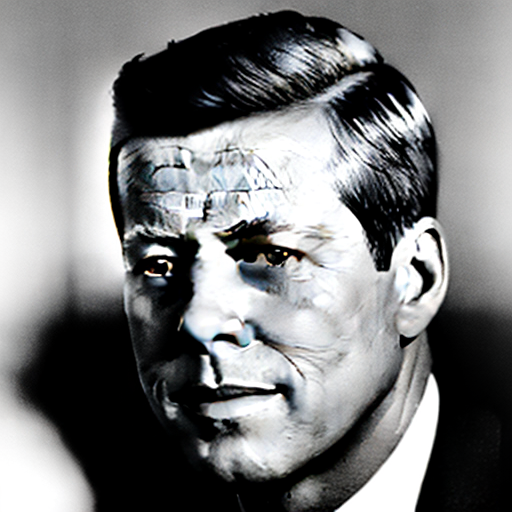John F. Kennedy, often referred to by his initials JFK, was the 35th President of the United States, serving from January 1961 until his assassination in November 1963. JFK was born in Brookline, Massachusetts in 1917, the second of nine children in the Kennedy family. He was educated at Harvard College and served in the U.S. Navy during World War II, commanding a patrol boat in the South Pacific.
After the war, Kennedy entered politics, first as a member of the U.S. House of Representatives, and later as a U.S. Senator from Massachusetts. In 1960, he ran for President as the candidate of the Democratic Party and defeated Richard Nixon in one of the closest presidential elections in U.S. history.
As President, JFK is remembered for a number of achievements. One of his most significant accomplishments was his leadership during the Cold War. He is credited with helping to ease tensions between the United States and the Soviet Union, which had been on the brink of nuclear war. He also played a key role in the formation of the Peace Corps, a volunteer organization that sends young Americans to serve in developing countries.
JFK is also remembered for his efforts to promote civil rights for African Americans. In 1962, he sent federal troops to the University of Mississippi to enforce a court order allowing an African American student to enroll, and in 1963 he proposed a comprehensive Civil Rights Act to Congress. Although the bill was not passed during his lifetime, it laid the groundwork for the Civil Rights Act of 1964, which was passed after his death.
JFK was known for his charismatic and youthful energy, which he brought to the White House. He was also known for his personal style and his glamorous image, which was often portrayed in the media. He was married to Jacqueline Kennedy Onassis, who was a well-known fashion icon and socialite.
Despite his achievements, JFK also faced a number of controversies during his presidency. One of the most significant was the Bay of Pigs invasion, a failed CIA-backed attempt to overthrow the Cuban government in 1961. The failure of the invasion was a major embarrassment for the Kennedy administration and led to a reassessment of U.S. policy towards Cuba.
Another controversy during JFK’s presidency was the Cuban Missile Crisis. In 1962, it was discovered that the Soviet Union had placed nuclear missiles in Cuba, just 90 miles from the Florida coast. JFK ordered a naval blockade of the island and after a tense standoff, the Soviet Union agreed to remove the missiles.
On November 22, 1963, JFK was assassinated while riding in an open car in Dallas, Texas. Lee Harvey Oswald was charged with the murder, but was himself killed two days later while in police custody. JFK’s death was a profound shock to the nation and the world, and it led to widespread grief and mourning.
The assassination of JFK also led to a great deal of speculation and conspiracy theories. Some people believe that Oswald did not act alone, and that there may have been a broader conspiracy involving multiple individuals or organizations. Despite numerous investigations and inquiries, no concrete evidence has been found to support these theories.
In conclusion, John F. Kennedy was a complex and multifaceted individual who had a significant impact on the United States and the world during his time as President. His leadership during the Cold War and his efforts to promote civil rights will be remembered as major achievements of his presidency. However, his legacy is also marked by controversies and the tragic circumstances of his death. JFK’s assassination remains one of the most significant and mysterious events in American history, and his legacy continues to be studied and debated today.
Tags: 35thPresident, Americanhistory, Assassination, BayofPigs, CivilRights, ColdWar, conspiracytheories, CubanMissileCrisis, JacquelineKennedyOnassis, JFK, JohnFKennedy, Kennedyfamily, LeeHarveyOswald, PeaceCorps, PoliticalBiography, Presidentiallegacy
Tweet
Wow, what a fascinating article about John F. Kennedy! I’ve always been intrigued by his life and presidency. It’s clear that he was a charismatic leader who inspired hope and brought a sense of optimism to the American people during a turbulent time. I admire his commitment to civil rights and his efforts to promote equality and justice for all citizens.
One thing that struck me while reading this article was Kennedy’s strong emphasis on diplomacy and peaceful resolutions. His handling of the Cuban Missile Crisis was a testament to his ability to navigate through tense international situations and prioritize dialogue over conflict. It’s refreshing to see a leader who sought to build bridges and find common ground rather than resorting to aggression.
On a more personal note, Kennedy’s charisma and youthful energy have always captivated me. He had a way of connecting with people and making them feel heard and valued. It’s unfortunate that his life was cut short, as I believe he had so much more to contribute to the nation and the world.
Overall, this article has deepened my appreciation for John F. Kennedy and his legacy. It’s important to reflect on leaders like him who inspire us to strive for a better future and remind us of the power of hope and unity. Thank you for sharing this insightful piece!